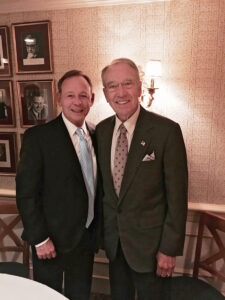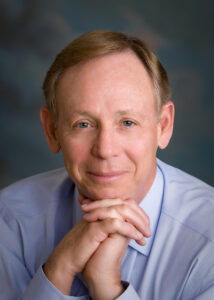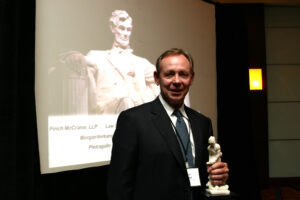



INTERVIEWS
CHRIS RIEDEL Q & A
1. What actions were Quest and LabCorp (and others) taking initially that hurt Hunter Labs and caused you to become a fraud fighter on behalf of the taxpayer?
Both Labs had core business models of hooking physicians with below cost loss-leader pricing for a small portion of their lab business in exchange for referral of all their Medicare, Medicaid and insurance business. This scheme violated federal and state antikickback laws. Second, California law mandates that lab companies lowest charge must be passed on to the state Medicaid (Medi-Cal) program. Medi-Cal was often overcharged 20 – 40 fold more than their lowest charges, costing taxpayers billions of dollars.
Members of my Hunter Labs sales staff had approached me, concerned for the company and their own livelihoods. “Chris, doctors want to use our lab; they hate Quest and LabCorp services,” a member of our sales team said. “But, we have to match their discounted prices…”
Marcia and I had invested most of our life savings into Hunter Labs. After much anguish and many sleepless nights, I realized that I had only three choices. The first was to knowingly violate federal and state law. The second was to close the business, terminate 150 hard-working employees, and lose most of our life savings. The third was to try to do something to stop the illegal frauds and level the playing field for honest labs, and the only way to do that was to file a Whistleblower lawsuit on behalf of the state of California. I chose to become a fraud-fighter. I hoped to rehabilitate the entire U.S. lab industry.
2. Tell us a little about Hunter Labs, the vision, the quality of work, and how shattering it was to lose the business due to the nefarious practices of others?
Our mission at Hunter was to provide service levels that would delight physicians. We answered their office calls within 3 rings, rather than forcing them to voice prompts and suffering long wait times before actually getting to a live person. This may not sound like much, but time is important to busy physicians’ offices. For example, a physician is with a patient and can’t find the lab results, with the Brothers it usually took a minimum of 10 minutes to call the lab and get a new report emailed. At Hunter, it took less than a minute.
While we looked to improve service levels, the large publicly traded “Brothers”, looked to cut costs by reducing service levels to “the least amount that would not drive off physician clients.” If they could save a quarter-cent per share by eliminating a service, that service was gone.
Among other problems, approximately 5 percent of test results never came back from one of the “Blood Brothers” due to lost specimens or lab problems. To give you an idea how egregious and dangerous this is, we treated a lost specimen like a lost child at Hunter. You didn’t lose specimens. It almost never happened with us. If a patient had a critical result, requiring immediate medical attention, a lost specimen could result in death.
Cytology testing for cervical cancer for both Brothers is so bad, that they allocate approximately $3 per PAP test for legal costs. This amounts to 20% of the average revenue per test. In my eighteen years as a Lab CEO, we have never had a legal cost for an incorrect PAP test. As described in Blood Money, if a PAP test is misdiagnosed, patients who could have been successfully treated can die a painful death.
Hunter’s mRNA HPV test for cervical cancer eliminated the 28% false positives reported by the DNA tests utilized by Quest and LabCorp. Imagine a woman being told that she had contracted a sexually transmitted disease (Herpes) when she did not have the disease. Eliminating false positive results also reduces the number of uncomfortable biopsies and colposcopies at a cost of more than $1,000. The Brothers DNA test for women younger than 30 are clinically useless, whereas Hunter’s mRNA test is accurate for women over 19 years.
If a patient billing question could not be quickly resolved, the patient would be put through to our President, Marcia. Only because our staff were so well trained could we implement this. The patient collection efforts of the Brothers are so egregious, that more than one patient has described them as “terrorists.”
If a test had to be repeated, we would sent a phlebotomist to the patients’ home to collect the blood rather than make them go to a Patient Service Center. Patients wait times at Hunter’s PSC’s were almost always less than 10 minutes vs. patient wait times often over one hour at Quest and LabCorp. This is because there are so many patients covered by loss-leader capitated contracts and Quest and LabCorp staff for maximum profitability rather than patient convenience.
I could go on. . .
3. Briefly talk about early cases, culminating in the $241 million judgment in California that really put you, Niall and Justin on the map as major fraud fighters in the medical lab space.
The early cases were against the two goliaths in the lab industry, Quest and LabCorp (referred to by Wall Street Analysts as the “Blood brothers”). It took over five years of hard work. I personally reviewed over one-million documents. Most nights after dinner I would go up to my office with a glass of wine and spend hours reviewing documents. But the effort paid off. I discovered three documents buried in three separate places among the million documents. When placed side by side they became a magic bullet showing precisely what we were trying to prove- deeply discounted below cost pricing were loss leaders for the purpose of capturing highly profitable Medicare, Medicaid, insurance and a small amount of patient billed testing; and that Medi-Cal was not receiving their lowest charges. I felt like I had struck gold.
I also learned how difficult it is to fight large companies who hire the biggest law firms in the country and file motion after motion, leading to delay after delay.
4. What prompted you to write Blood Money?
I believe readers will enjoy my fraud fighting journey. The story includes attempted murder, extortion, money-laundering, fraudsters attempting to hide money in the Cayman Islands, gold buried in a storage container in a CEO’s backyard, an Assistant Attorney General sabotaging her state’s case, and the Florida Governor being bought off to stop litigation by his own Attorney General.
I want prospective Whistleblowers to know how risky it is and provide them a ”Rules for Whistleblowers” (which is Chapter 32), based on what I have learned. The likelihood of success is less than being hit by lightning, and the fraudsters will do everything they can to destroy Whistleblowers. Their lives will never be the same. Many whistleblowers are utterly destroyed. They end up unemployable, divorced and bankrupt. I believe the “Rules for Whistleblowers” chapter is an absolute must read for anyone thinking about it. I also hope that readers will come to respect the courage of Whistleblowers standing up for taxpayers.
Finally, I hope that DOJ will give serious consideration to the nine simple suggestions I provide for improving their success fighting healthcare fraud. If DOJ implement these simple suggestions, I believe fraud will finally be dramatically reduced. It would be like fighting a war with tanks rather than pistols.
5. What is the extent of medical fraud in the United States today? Is it still going on? Do you feel there’s much more you can do to call attention to this and hold companies accountable?
In 2011, the FBI estimated that up to $234 billion was lost to healthcare fraud annually. Imagine if we recovered just ten percent of that; we could make a huge improvement in the system. Yet, in 2019, DOJ announced that it collected just $2.6 billion in settlements and fines, the lowest sum in more than a decade, and but 1.3 percent of the FBI’s annual health care fraud estimate. “Some criminals are switching from cocaine trafficking to prescription drug fraud because the risk adjusted rewards are higher: the money is still good, the work is safer and the penalties lighter,” Reuters reported.
There is a lot of room for improvement in government enforcement, particularly with Medicare and Medicaid expenditures totaling more than $1 trillion annually. I am continuing to investigate healthcare fraud and I am pursuing some very big cases
How do we go about changing that? Reducing crime requires a simple, singular mindset: white-collar crime does not pay, and fraudsters will be severely punished. However, this has not been the case. The lack of criminal prosecutions that send fraudsters to prison and reliance on “affordable” civil settlements telegraphs a DOJ tolerance to financial healthcare fraud. In fact, fraudsters risk/ reward analysis encourages them that fraud pays very well, with little personal risk. It is the shareholders who end up funding civil settlements. In Blood Money I have detailed 9 simple changes DOJ can make that will dramatically reduce healthcare fraud.
6. You’ve been a CEO nearly your entire career, one who has strong ethics and a deeply honest approach to life and business. As you dealt with these labs, how did you feel to see the stark dishonesty and malicious practices of other CEOs — and how they tarnished the good works of honorable CEOs?
I was shocked to the core to discover blatant fraud designed by CEO’s at such rampant levels in healthcare. I was also shocked to learn that it is true that companies are “too big to fail’ and “too big to jail”. No matter how egregious the fraud or how many previous frauds a company has committed, DOJ usually lets companies settle for 20 – 30 cents on the dollar for the amount stolen. No one is fired or loses the bonuses they achieved as a direct result the frauds. How is this going to deter fraudsters?
It is very frustrating for honest CEO’s to see that they cannot compete well against companies employing fraudulent schemes. Rather than compete on the quality of service or their products as honest companies do, fraudsters compete based on the value of their illegal inducements. I felt the pain that many other honest CEO’s and lab owners have had to endure as they try to compete with fraud and watch their life’s work destroyed.
Fraud has certainly tarnished the lab industry. As one of our signature programs, HunterHeart addressed the number one killer in the U.S., heart disease. With newer drugs and tests that identify specific causes of cardiovascular disease, this dreaded disease can now be prevented in almost all people. And reversed in many others. Unfortunately, several cardiovascular labs so tarnished this segment of the industry that Medicare, Medicaid, and insurance companies stopped paying for lifesaving advanced CVD tests. Fraudsters so tainted this segment that it has almost ceased to exist. The only survivors are Cleveland Heart Lab, which, facing economic pressure, was assimilated by Quest in 2017, and a small lab owned by Chinese investors.
7. You were named Taxpayers Against Fraud 2011 Whistleblower of the Year. What did that honor mean to you? And what do you feel TAF’s lasting value is to corporate governance and the customer/taxpayer?
The first I heard about TAF was when Niall McCarthy called to tell me that I had won the award. When I went to the Annual meeting to receive the award, I did not know what to expect. I was stunned to see a ballroom full of attorneys and to be seated next to the Civil Division Chief for the Department of Justice. I was even more surprised when it dawned on me that I was going to have to make an acceptance speech. I walked to the podium to accept the award without having any idea what to say.
Today, I better understand the significance of this award. I now know how rare it is to succeed against billion-dollar companies. When I began in California, I believed in my heart that the facts and the law were clear, and we would prevail. After California I learned that this does not always matter.
Winning the award has also afforded me the opportunity to spend time with other recipients- all of whom are outstanding, very brave people.
TAF has done a wonderful job fighting for taxpayers in the war on corporate fraud. It is the only non-profit organization I know that assists attorneys and whistleblowers. The TAF staff is very knowledgeable.
8. Following (and during) California, your fraud fighting efforts left the state, and became nationwide. All well chronicled in Blood Money. What motivated you and your attorney team to turn this into a national cause?
We were asked by California Assistant Attorney General Dennis Fenwick, the lead DOJ Attorney in our California case, to bring similar lawsuits in other states with lowest charge laws. He was outraged at the blatant Medicaid theft across the country and wanted to end it.
9. What do taxpayers not realize about how lab billing to Medicare or states is handled by these unscrupulous companies?
It is very difficult to identify Medicare or Medicaid billing fraud. The physician who orders the test does not get a bill, so the physician has no way to know whether the appropriate billing codes are used. Upcoding, where the wrong code is used to increase reimbursement, was found in several of our cases.
There are some generic codes which identify a method, but not the actual test. Medicare and Medicaid have no idea what tests they are paying for and whether the right code was used.
Physicians and taxpayers have no idea if lowest charges required by law in many states are passed onto the Medicaid program. Blood Money describes the detective work I had to go through to verify what was charged to Medicaid.
When bribes are paid to physicians to order large panels of tests with the agreement that patients will never see an invoice, there is no incentive for physicians not to go along with routine ordering of these panels. Yes, physicians are supposed to judge the medical necessity of each test on a patient by patient basis, but there is no downside for their patients since they will never be billed.
10. Tell us briefly about some of your big wins since 2011 — and your big disappointments — on which you expound in Blood Money?
Our biggest wins were against labs that paid cash for physician referrals, never invoiced patients for deductible and co-payments required by their insurance plans and devised novel money laundering schemes.
The disappointments are many. I never anticipated that government lawyers would refuse to work with us. Or that we would face outright hostility from prosecutors, who treated us as if we were the criminals. I also never dreamed that a sitting Governor would sabotage his own Attorney General’s case. Or that a judge would throw out a case because the State Attorney General took a long time to prepare it. Throwing out a case due to solid preparation?
11. You work with two great attorney partners in Niall and Justin. How has their dedication, commitment to the cause and teamwork with you advanced your efforts — and drawn more attention to this issue nationally?
Niall and Justin are not only whip smart, great attorneys, they are honorable and fun to be with. We have become friends over the years. Without them, I might never have become a fraud fighter and certainly would not have continued outside California.
As for national attention, Niall is very good at writing press releases.
12. What changes do you feel need to happen in the medical lab space in the 2020s for fraud to be reduced, the taxpayer to not be ripped off, and the quality of tests to rise to the level of, say, what Hunter was providing? What would be a “perfect day” in this space, in your eyes?
There is an entire chapter in Blood Money dedicated to this. The best change- stop allowing fraud to be profitable. Taxpayer thieves need to spend time in prison. Second, require that the executive team and the Board of Directors disgorge all payments received during the fraud. This will encourage Boards to put a serious lens on business practices.
13. Personally speaking, how enriching or fulfilling has this work been for you — and why?
Even though it is very risky and the book details how my life was almost destroyed when the Blood Brothers counter attacked, I enjoy the investigative work and legal challenges. For me, it is very fulfilling, and I am proud to carry the torch for taxpayers.